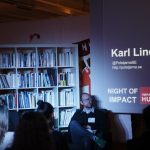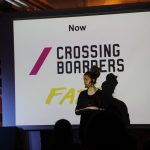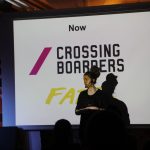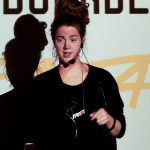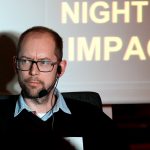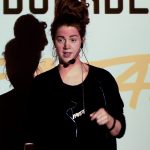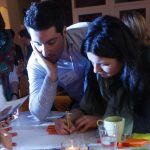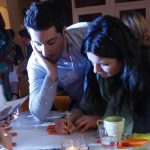 As part of our ongoing effort to promote young entrepreneurship in the suburb Farsta, we were asked to showcase our work during the local culture week. When discussing how we would like to do this, we wisely said it would be best to keep it small. But during the first brainstorm sessions it became clear that we had too many ideas and ambition to limit ourselves like that. So when our partner Atrium Ljungberg offered us to use an empty 200 square meter store as an exhibition space we just had to go for it. After a lot of hard work we managed to transform the space into a make-shift Impact Hub.
As part of our ongoing effort to promote young entrepreneurship in the suburb Farsta, we were asked to showcase our work during the local culture week. When discussing how we would like to do this, we wisely said it would be best to keep it small. But during the first brainstorm sessions it became clear that we had too many ideas and ambition to limit ourselves like that. So when our partner Atrium Ljungberg offered us to use an empty 200 square meter store as an exhibition space we just had to go for it. After a lot of hard work we managed to transform the space into a make-shift Impact Hub.Author
Collecting Dreams in Farsta
On the 14th of February we organised a dream market in the suburb of Farsta (South of Stockholm). In the local shopping centre we set up a small market place where people could “buy” a heart shaped chocolate cookie with a special kind of currency – their dreams. In less than three hours we managed to talk to around 150 people and collected 120 dreams of the people in Farsta. And what is it the people in Farsta dream about? All kinds of things, from new jobs, travelling, starting their own business, doing something for a charity, thanking the people around them for their support during hard times. The diversity in all these dreams was unbelievable, but also very inspiring. Dreams lie so close to the heart, that it seemed impossible not to be touched by this experience.
Vi är Farsta
The dream market was part of our ongoing project Vi är Farsta, an initiative that gathers and shows all the great things that are happening in this particular suburb. We are currently working with a special programe for young entrepreneurs, supporting them to start their own business. Focusing on the dreams of these young people is inspiring to us and we hosted the dream market to find more people that are trying to follow their dreams.


The outcome of the dream market was great, as you can see in the slideshow below. We gathered one hundred and twenty dreams from people with all kinds of background and age. This really showed us how diverse the community in Farsta is.
The concept
The dream market concept was developed during the ACSI social innovation camp that took place in Malmö last year. Based on the challenge “How do we best stimulate people’s ability to take initiative and create development?”, a multi-disciplinary team came up with the idea of hosting dream markets. The concept is based on the idea of creating a temporary place where people are invited to dream, think about their aspirations, inspire themselves and the others around them. Based on their dreams, the facilitators of the dream market can make connections between people that have similar or matching interests. By doing this you can create a ecosphere in which people dream, meet, connect and take initiative. A first successful test took place last October in Farsta, which was repeated this year to spread the idea of dreaming even more.
Why talk about dreams?
The one thing we all have, no matter where we are from or what we do, are our dreams. Dreams often motivate us and make us think about life in a more creative way. This is why we at Impact Hub always talk about our dreams to inspire each other. Often our businesses are based on dreams and hearing about this can motivate each other to pursue what we really want to do in life. All dreams are accepted as a valid currency in the dream market
Do you want to organise a dream market yourself?
Please do not hesitate to contact us. We are more than happy to share our experiences and the material we have gathered so far. In our experience it does not take much money or time to set up. The reward however, spreading happiness and inspiration, will compensate your investment beyond your imagination!
Author
Vi är Farsta 2


The idea for this years challenge comes from the research results in the previous Vi är Farsta project. The White Label Project team identified that there are many people and events with community building potential in this particular suburb. Unfortunately, this potential is nearly invisible and does not translate into the development of social connections or new businesses. This new initiative aims to encourage people to step up, show the activities there are and actively involve people in the development young entrepreneurial ideas.
Involving students and local mentors
During January/February we will recruit six so-called “rough Farsta diamonds”. These diamonds are young people (between 16-30 years old) with an idea for an enterprise or initiative that we would like to support in their development. In order to support these young people, we will link them with a mentor based in Farsta and a university student. Based on the kind of initiative or idea, we will find a local mentor and student that can really contribute with their skills, local network and knowledge. During the three months that follow, this mini team (diamond, mentor & student), will follow a process that takes their idea to the next level. The recruitment of mentors and students will take place in February 2014. If you would like to participate in the project, or support the young entrepreneurs in any other way, please contact Geert van den Boogaard to discuss what possibilities there are.
Our network
By being active as a project team in Farsta in 2013, we have connected with many different organizations, people and companies that support the initiative**. These actors include our Farsta ‘everyday heroes’ that have their stories posted on the Vi är Farsta platform already, but also the Tuben youth centre, Fanfaren cultural centre, the coaches at Jobbtorg and Drivhuset, Tyngdpunkt Farsta and Real estate developer Atrium Ljungberg. These different actors that we connected with during the first project are committed to collaborate with us on the continuation of Vi är Farsta 2.
*The White Label programme is designed and managed by Impact Hub members Geert van den Boogaard and Kathleen Asjes. Please feel free to contact them if you are interested in participating in their projects.
** Vi ar Farsta 2 has received funding from the Vinnova programme ‘Ungas Innovationskraft‘. Impact Hub is proud to collaborate with our partners Hotspots/Atrium Ljungberg and Tyngdpunkt Farsta in this project.
Author
The Night of Impact event series has officially been launched with a great evening featuring inspirational stories by two Hub members and a combined effort of the crowd to come up with new solutions for the challenges these entrepreneurs face.
With the kick-off of this event series focussing on the theme of health, we highlighted the stories of Stéphanie Treschow and Peter Carstedt, both Hub members and active in this field.


Stéphanie Treschow is the Founder of Modern Aging and Country Manager Sweden of the organization ACCESS Health International. She works with the development of innovation and sharing best practices in the field of elderly care. Stéphanie made a complete career turnaround when she switched from stockbroking in London to start a not for profit organization focused on her passion that lies in the wellbeing of the frail elderly. She shared the story of her personal journey that led her back to Sweden and working in this field.


Peter Carstedt is the Founder of MOD – More Organ Donation. He fights to save the lives of people in need of an organ transplant. The ambition is to start a movement in Sweden to increase the awareness and say YES to organ donation. In just one year, MOD has developed a new way to share your intention via a digital donation card, reached out to over millions of swedes through nationwide media and social media, and has been invited to participate on government committee overseeing the current legal and healthcare system. Peter shared how he established MOD and how he continues to lobby for positive change the health sector.
Stéphanie and Peter both shared two challenges they have to deal with in the near future and invited all the participants to engage in a co-creation process to come up with potential solutions for them. In less than an hour, 50 people put all their attention to coming up with fresh ideas that could support the entrepreneurs. At the end of the evening, all solutions were shared with each other which concluded the first successful night of Impact.
The next Night of Impact will take place on the 28th of November were you will have a chance to contribute your ideas and interact through a facilitated impact design process developed by to engage in real challenges with the theme conscious consumerism. Together we will respond to these challenges and amplify impact!
This event series has been designed and organised by a large group of volunteers at Impact Hub Stockholm and is supported by the following organizations Ashoka Scandinavia, Impact Hub Stockholm, Mötesplats Social Innovation, Reach for Change Sweden, SE Forum, Artister för Miljön and Social Initiative.
Author
Building a European Network of Incubators for Social Innovation
Impact Hub Stockholm joins a cluster of Hubs to support social innovators to meet Europe’s challenges.
To build a Europe-wide network of incubators capable of identifying the most impactful social innovations – new solutions to Europe’s most pressing social and environmental needs – and to deliver those support services that are necessary to help them scale successfully across the continent.
BENISI is a three year EU-supported project the Impact Hub Network is launching on 1 May 2013 with project lead i-propeller, in collaboration with DIESIS, the European Regional Authorities Development Agency (EURADA) and philanthropic foundations such as Cariplo Foundation and the European Network of Foundations of Social Economy (PEFONDES).


“Networks are already structured in a collaborative mode; they are more able to spread knowledge and practice horizontally and they are the perfect ally when trying to develop a Europe-wide programme that needs to balance local action with continent-wide strategy and vision,” says project lead Max Bulakovskiy of i-propeller based in Brussels.
The aim of this trans-European consortium is to identify and highlight three-hundred of the most promising, impactful and employment-generating local social innovations – in the public, private, third, social enterprise and cooperative sectors – that are yet to be scaled either significantly within their originating country or internationally. The consortium will create the conditions for these solutions to be strengthened locally and transferred to other European localities.
“Europe is not facing a crisis of opportunity. On the ground in our Impact Hubs, we witness every day citizens responding to the times through prototyping entrepreneurial initiatives that make their communities a better place.” says Alberto Masetti-Zannini, founder of Impact Hub Milan and BENISI project coordinator on behalf of the network of Impact Hubs.
The project will involve six Impact Hubs: Amsterdam, Bucharest, London-Kings Cross, Milan, Stockholm, and Vienna as pivot points within five different geographic clusters of EU and neighbouring countries. These Impact Hubs will collaborate within the Hub network and with partners to encourage social entrepreneurs to scale-up their ventures for positive impact in Europe.
The project coordinator in Stockholm is Jesper Kjellerås, director of Impact Hub Stockholm. For further information, visit the BENISI website, contact Jesper Kjellerås or Alberto Masetti-Zannini, Impact Hub EU Cluster ([email protected] +44 7811 385279)

